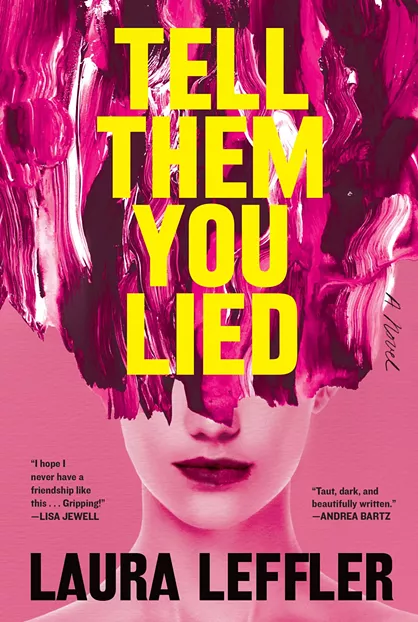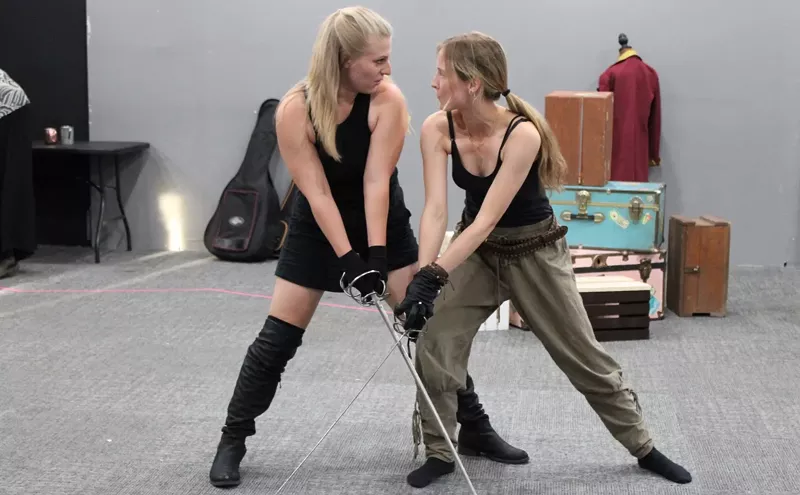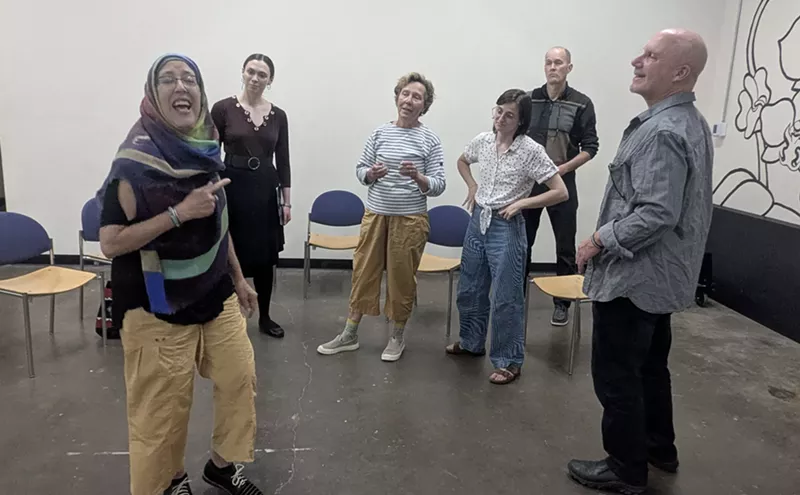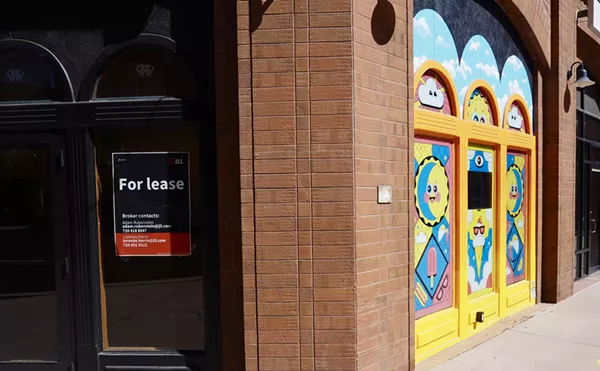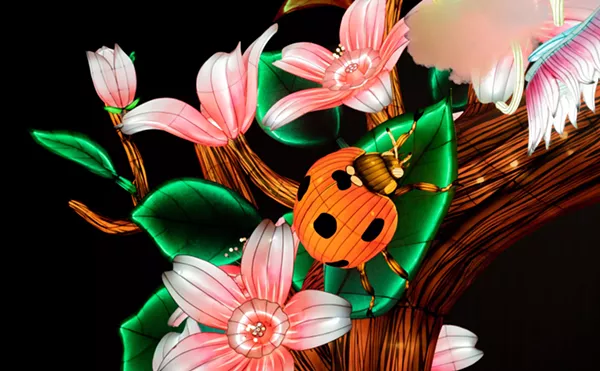Laura Leffler has lived in Denver for going on a decade, but she's still working out all she experienced in her time living in New York City in the early 2000s. It was the Big Apple art world; it was the disaster and aftermath of 9/11; it was coming into adulthood in a world that felt unstable and uncertain. When the sky — or at least the buildings that line it — could literally fall.
Which is how Leffler's debut novel Tell Them You Lied came about. Leffler will be reading from her new book at a couple of local events: first at 6 p.m. on Tuesday, May 27, at Robischon Gallery, in partnership with Petals and Pages, and then at 5:30 p.m. on Friday, May 30, at Tattered Cover Aspen Grove.
Leffler says she ruminated on the book for years, and finally wrote the first chapter in 2017, only to put it aside for more pressing matters like life, her family, other work. But when the pandemic hit in 2020, she returned to it with renewed vigor. "When COVID came about, I just thought it was time," she recalls. "We all had the time, right? But I was also frustrated. I needed that escape. Needed to live in this other world for a while."
That world — the early 2000s in the NYC art scene — was one that haunted Leffler to a degree. That's the impulse that drives most writers, that need to exorcise our most insistent ghosts. "I really wanted to write about that feeling of being in New York in and around 9/11," says Leffler. "The instability of everything. It was a coming-of-age story before it became a thriller. The art world was in some ways a write-what-you-know thing, but I've always been interested in process and materials and how artists come up with the things they come up with."
If that sounds like a plot hatched by a former art critic, there's a reason for that. "I wrote art reviews for City Beat," says Leffler, "which is like Cincinnati's Westword. I even served as the editor for the visual arts for a while. I interviewed a lot of artists and found them to be so interesting. It struck me then that I was more drawn to the reasons they created the art than to the art itself sometimes. It was fascinating to me. Tell Them You Lied let me explore that a little."
But it wasn't just her experiences in the art world in both New York and Ohio that inspired Leffler's novel. "I also got obsessed with muses, all these women who are the focus of these paintings, these sculptures, and we really don't know who they are," she says. "And then at the same time, there's this constant cultural barrage of women in magazines, on TMZ, things like that. There's an effect all that has on a woman's psyche. I wanted to explore that, too."
Leffler also wanted to pay tribute to women artists throughout the years. "There's this strong tradition of female artists who before they were really allowed to be artists would often paint themselves. They weren't able to use live models, or go to school, or serve apprenticeships. So they painted self-portraits. Worked images of themselves over and over again, trying to see themselves in this world where everyone is watching them.
"So all that just sort of came together," Leffler continues, laughing. "I don't know how."
The thriller aspect of the book came much later in the process. And organically, too. "I found myself really intrigued by the idea of an unlikeable female character, sort of the bad-guy protagonist," Leffler says. She rattles off a number of authors who inspired her: Gillian Flynn, Lisa Jewell, Andrea Bartz. "It seemed so rebellious. But I think it was also about structure," she adds. "The scaffolding of the thriller was helpful to the story. That took me a long time to figure out, but once I did, it really opened things up. I wanted to do what Jessica Knoll did in Luckiest Girl Alive: write about these very dark emotional things in a way that gives readers permission to be okay with it, and to be entertained. I wanted to give the reader the opportunity for empathy for a character they wouldn't want as a friend."
Writing a novel is a long process; the earth can shift under the feet of an author in the span of a narrative's genesis to its eventual publication. It's more than the old maxim about never being able to step into the same river twice; the early-21st-century world of Tell Them You Lied is very different from the 2017 world in which it first came into being, which is again a whole different place into which the book comes in 2025.
"I think there's a reason why this novel resonated so much with me in 2020," Leffler muses. "When I started the book, it was all about instability, right? And what was more unstable than America in 2020? That feeling that you're not certain of anything, not even certain of how this day you're in might end. It felt very dangerous. It feels like that again. There's something connecting all of this."
Laura Leffler will read and sign copies of Tell Them You Lied at 6 p.m. Tuesday, May 27, at Robischon Gallery, 1720 Wazee Street; and at 5:30 p.m. Friday, May 30, at Tattered Cover Aspen Grove, 7301 South Santa Fe Drive, Littleton.

Audio By Carbonatix
[
{
"name": "GPT - Billboard - Slot Inline - Content - Labeled - No Desktop",
"component": "23668565",
"insertPoint": "2",
"requiredCountToDisplay": "2"
},{
"name": "STN Player - Float - Mobile Only ",
"component": "23853568",
"insertPoint": "2",
"requiredCountToDisplay": "2"
},{
"name": "Editor Picks",
"component": "17242653",
"insertPoint": "4",
"requiredCountToDisplay": "1"
},{
"name": "Inline Links",
"component": "18838239",
"insertPoint": "8th",
"startingPoint": 8,
"requiredCountToDisplay": "7",
"maxInsertions": 25
},{
"name": "GPT - 2x Rectangles Desktop, Tower on Mobile - Labeled",
"component": "24956856",
"insertPoint": "8th",
"startingPoint": 8,
"requiredCountToDisplay": "7",
"maxInsertions": 25
},{
"name": "Inline Links",
"component": "18838239",
"insertPoint": "8th",
"startingPoint": 12,
"requiredCountToDisplay": "11",
"maxInsertions": 25
},{
"name": "GPT - Leaderboard to Tower - Slot Auto-select - Labeled",
"component": "17676724",
"insertPoint": "8th",
"startingPoint": 12,
"requiredCountToDisplay": "11",
"maxInsertions": 25
}
]


